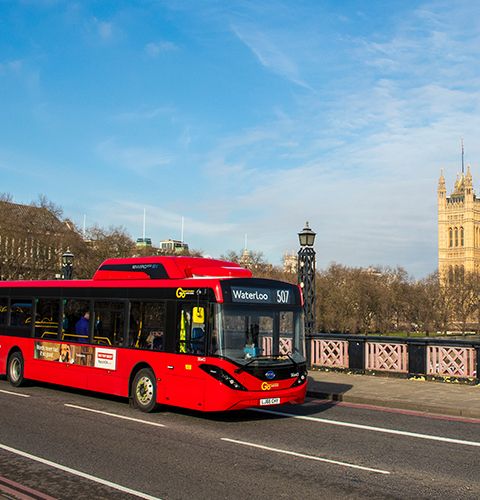Go‑Ahead London’s switch to electric has saved 700 tonnes of CO2 to date.
At Go-Ahead, sustainability means reducing our negative impact
and increasing the shared value created with our stakeholders,aiming
to ensure the viability of our business for the long term.
Our stakeholders expect from us good practices that contribute to the long term sustainability of the organisation and deliver the best possible service to our customers.
At Go-Ahead London, we strive to provide a reliable and safe bus service that people can trust. It is crucial that we consider the environment in our decision making too. We have a corporate responsibility to our customers, the communities we serve and more widely to society.
As a public transport provider, we offer an environmentally friendly mode of travel for our passengers and are part of the solution in reducing emissions.
Go-Ahead London publish Green Bus Talk each year on Earth Day, which is an international day with the aim to raise awareness about the importance of looking after the environment. These special editions of Bus Talk, exclusively focus on the company’s contribution towards a Zero Emission (ZE) future. They can be found here (add link)
As the country’s most experienced, and largest, ZE bus company, we are working with Transport for London (TfL) and supply chain partners to decarbonise our vehicles and premises.
We are part of The Go-Ahead Group, an international provider of passenger transport. The Go-Ahead climate change strategy can be read in full via www.go-ahead.com/sustainability.
Across Go-Ahead, we have the following commitments. Go-Ahead will:
· Become a net zero business by 2045
· Reduce our carbon emissions by 75% by 2035
· Reduce our air pollution emissions by up to 63%
· Reduce our water use by a quarter by 2025
· Increase our waste recycling rate to 60% by 2025
Our commitment to the planet is real and it extends beyond the buses we operate. In 2024, we anticipate further buses being made electric and a number of buses will be introducing ZE buses.
The future is GREEN.
United Nations - Sustainable Development Goals
The United Nations vision for a more sustainable planet has 17 Sustainable Development Goals (SDGs).
We recognise that we play an important role in society and can contribute positively to this vision. Of these goals, we have identified five where we believe we can make a positive social impact.

Waterloo goes electric
In 2016, Waterloo converted from diesel to fully electric EnviroEvs. In comparison to the diesel buses they replaced, these high capacity single decker vehicles are more efficient by 700 tonnes of CO2 per year and have improved London’s air quality since their introduction. They can achieve a 16-hour service cycle without recharge, which is a first for any London bus operator. Popular with passengers, they also boast seat-back USB charging points and audio-visual digital screens that display maps and announce stops.
Routes 507 (Waterloo to Victoria) and 521 (Waterloo to London Bridge) predominantly serve commuters travelling to and from National Rail stations in the heart of the city.
The electric journey continues. Since their introduction at Waterloo in late 2016, a further two Go‑Ahead London services have been converted to electric bus operation. The first was route 360 (Elephant and Castle to Royal Albert Hall) in November 2017, followed by route 153 (Finsbury Park to Moorgate) in February 2018. As a result, the company has, to date, safely operated over 3.5 million emission-free electric bus miles. Routes 100 and 214 are also scheduled to start using electric buses during 2019.
Sustainable Transport Award
Waterloo electric bus conversion won the Sustainable Transport category at 2017’s National Corporate Sustainability and Responsibility Awards, where we beat competition from Manchester Airport and United Parcel Service (UPS).
The awards recognise organisations that have demonstrated a commitment to change and the judges described the Waterloo project as having “delivered real health benefits for all and set the benchmark for future schemes”.
This accolade comes a couple of months after our success at the London Transport Awards, where Waterloo collected the Contribution to Sustainable Transport prize.
Both of these achievements reflect the hard work put in by a number of colleagues and we congratulate all concerned.

